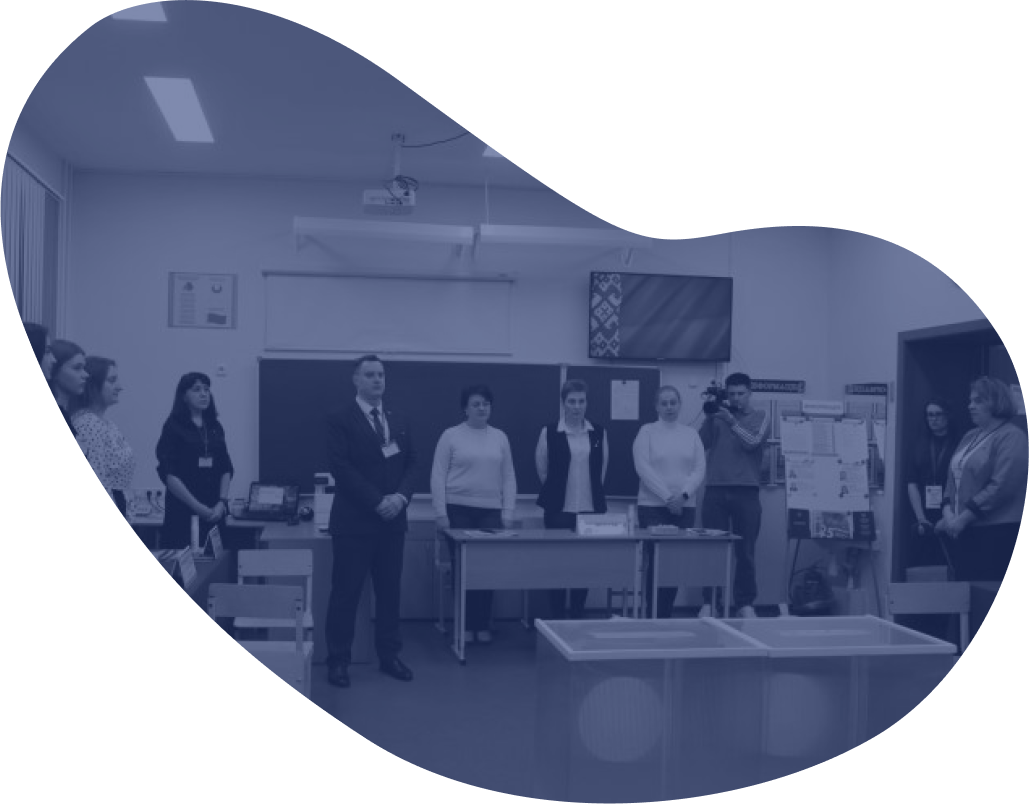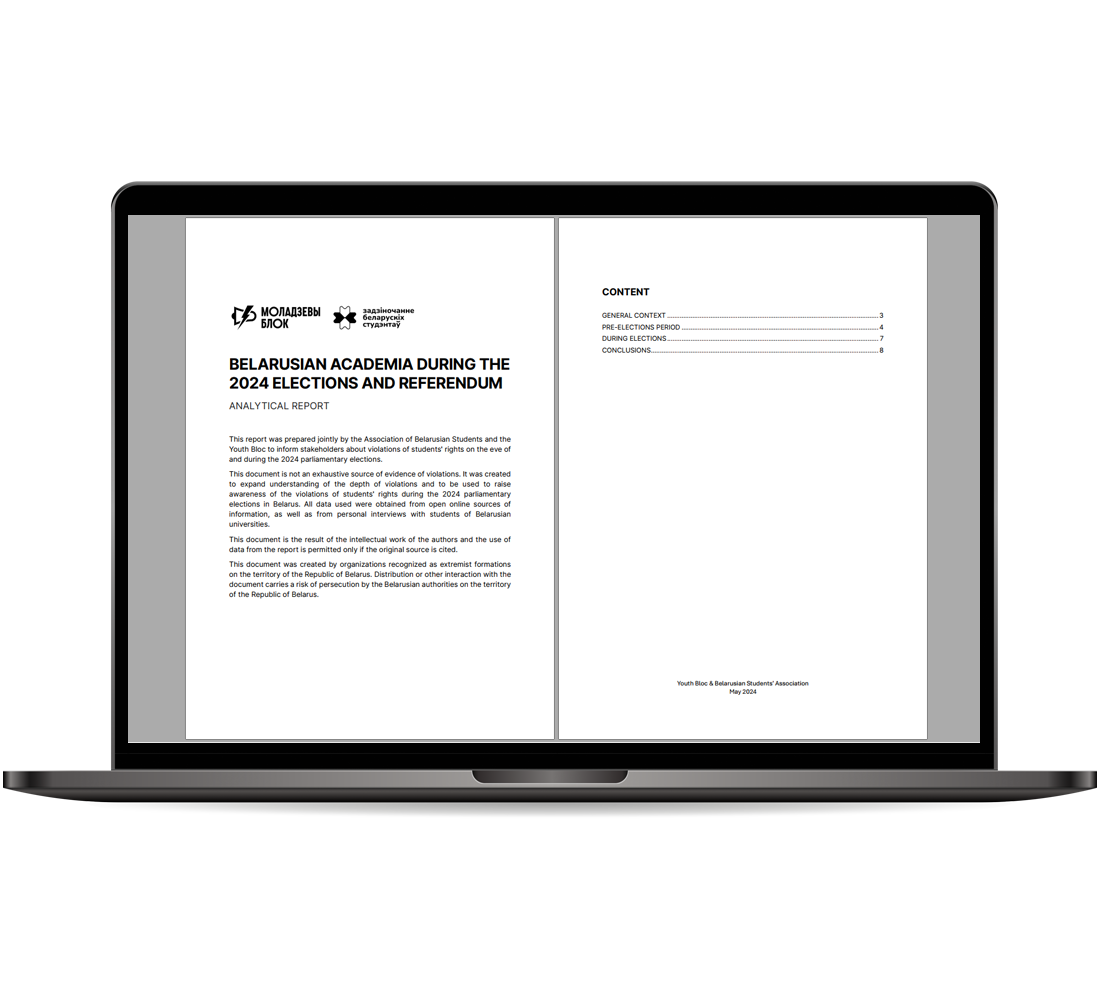This report was prepared jointly by the Belarusian Students’ Association and the Youth Bloc to inform stakeholders about violations of students' rights on the eve of and during the 2024 parliamentary elections.
This document is not an exhaustive source of evidence of violations. It was created to expand understanding of the depth of violations and to be used to raise awareness of the violations of students' rights during the 2024 parliamentary elections in Belarus. All data used were obtained from open online sources of information, as well as from personal interviews with students of Belarusian universities.
This document is the result of the intellectual work of the authors and the use of data from the report is permitted only if the original source is cited.
This document is not an exhaustive source of evidence of violations. It was created to expand understanding of the depth of violations and to be used to raise awareness of the violations of students' rights during the 2024 parliamentary elections in Belarus. All data used were obtained from open online sources of information, as well as from personal interviews with students of Belarusian universities.
This document is the result of the intellectual work of the authors and the use of data from the report is permitted only if the original source is cited.


Main conclusions
- Despite our active efforts to collect first-hand information about the electoral campaigns and violations of students' rights, we faced significant challenges. The tense political situation in the country has created an atmosphere of fear among students that prevents them from sharing their experiences even anonymously.
- The fear of possible negative consequences is so widespread that it discourages people from sharing their opinions on political and sensitive topics. This fear underscores the serious problems we face in trying to uncover the true extent of student rights violations. The government's continued suppression of civil liberties and intimidation tactics hinder transparency and accountability, making it difficult to highlight these critical issues.
- However, the comments we have been able to gather corroborate information from various media outlets. Many out-of-town students are particularly vulnerable to threats and pressure because they risk losing their dormitory space if they speak out. This makes them particularly vulnerable to coercion, as their housing situation is directly dependent on compliance. Those who did not comply were summoned and threatened with expulsion, bad profile for job referrals and refusal to extend their stay in the dormitory.
- In addition, students were forced to sign several controversial documents. The first one dealt with security issues: it defined the obligations not to bring weapons and not to organize terrorist attacks. The second document prohibited insulting state symbols and the president, and also prohibited mass riots.
- Students risked losing scholarships and facing problems in exams. Fear of academic and financial consequences became increasingly significant, creating an environment in which the price of speaking out seemed too high.
- Belarusian students have become a propaganda tool through forced participation in fake pro-government demonstrations aimed at reinforcing regime legitimacy, building an image and securing broad support. Students' ability to resist such participation is severely limited by the same threats to their housing, financial support and academic performance.


General context
The situation with political parties in Belarus has become even more complex and restrictive since the mass protests of 2020. The actions of the authorities have become brutal towards the political opposition, which has serious consequences for democracy and civil liberties in the country.
One of the main obstacles to political activity in Belarus has been the re-registration of parties. The requirements for this were high and practically unattainable for many opposition movements. As a result, this led to the liquidation of many opposition parties, which in turn allowed parties loyal to the government to monopolize the political system. At the beginning of 2023, there were 15 political parties in Belarus. As a result of re-registration, only 4 pro-government parties remained: Belaya Rus, LDPR, Communist Party of Belarus and Republican Party of Labour and Justice.
The dominance of parties supporting Lukashenka only worsens the situation. These parties actually have no real political weight and fulfil their functions as a system of control over the political process rather than an instrument for expressing the voice of citizens.
The requirement of 5,000 members to create a new party cuts off the possibility of developing new political initiatives in the country. This practically creates a monopoly in the hands of the existing authorities, which makes the opposition helpless.
Thus, the elections were held without the participation of the democratic opposition. Moreover, citizens living abroad were not able to vote at the local level, which poses serious problems given the large number of emigrants. This disenfranchisement undermines the democratic principle that every citizen's voice should be heard, regardless of their location.
The OSCE, the USA, NATO and a number of European countries did not recognize the elections and expressed support for the Belarusian democratic movement.
One of the main obstacles to political activity in Belarus has been the re-registration of parties. The requirements for this were high and practically unattainable for many opposition movements. As a result, this led to the liquidation of many opposition parties, which in turn allowed parties loyal to the government to monopolize the political system. At the beginning of 2023, there were 15 political parties in Belarus. As a result of re-registration, only 4 pro-government parties remained: Belaya Rus, LDPR, Communist Party of Belarus and Republican Party of Labour and Justice.
The dominance of parties supporting Lukashenka only worsens the situation. These parties actually have no real political weight and fulfil their functions as a system of control over the political process rather than an instrument for expressing the voice of citizens.
The requirement of 5,000 members to create a new party cuts off the possibility of developing new political initiatives in the country. This practically creates a monopoly in the hands of the existing authorities, which makes the opposition helpless.
Thus, the elections were held without the participation of the democratic opposition. Moreover, citizens living abroad were not able to vote at the local level, which poses serious problems given the large number of emigrants. This disenfranchisement undermines the democratic principle that every citizen's voice should be heard, regardless of their location.
The OSCE, the USA, NATO and a number of European countries did not recognize the elections and expressed support for the Belarusian democratic movement.


Pre-election period
During the campaign period, special attention was paid to ‘patriotic education of young people’ during various ‘dialogue platforms’ and ‘open dialogues’ in secondary and higher education institutions, as well as in their coverage in social networks and the media. At the same time, participants of such information events were often in a position of dependence on the speakers, and attendance at such events could actually be mandatory.
Pre-election campaigning started in Belarusian universities since autumn 2023. Campaign events were held in a number of higher education institutions in Belarus, including BelSUT, MSPU, GrSU, BSU, the Academy of the Ministry of Internal Affairs, the Mogilev State Medical College and the Academy of Public Administration under the aegis of the President of the Republic of Belarus. Seminars and dialogue platforms were held with students.
The campaign also touched upon the activities of teachers. For example, BSU Rector Andrei Karol at the meeting with teachers of the Faculty of Geography and Geoinformatics spoke about the need to talk to students every day about taking part in elections, to discuss the importance of expressing one's civic position and the importance of participation in elections.
At the same time at such events students, teachers and even schoolchildren were intimidated with liability for participation in ‘extremist and terrorist activities’. For example, the students of BrSU were given a tour of the Investigative Committee of Brest Region and told about the dissemination of extremist information.
Students of Gomel Pedagogical College, students of VSAVM, teachers of Borisov State College, young people of Naravlanski district and students of secondary school No. 16 in Minsk were also told about the liability for "extremism".
The administration of the Gorky Agricultural Academy (BSAA) forced the students to leave thier signature for the nomination of Natallia Glushakova, a lecturer and dean of the Faculty of Business and Law of BSAA, for the position of deputy.
On 21 December the Belarusian-Russian University (BRU) held a meeting of the student council with the participation of the members of the faculty council ‘on the election campaign’, which was held by Tatsiana Menshikova, deputy head of the department of mass media and youth policy of the Main Department of Ideology of Mogilev Regional Executive Committee. She briefly spoke about the Electoral Code of Belarus and moved on to the topic of students' participation in the election campaign. The main goal is that the elections should be held with a high turnout of students, which will be managed by university curators.
A Youth Information Group has been set up at the Mogilev State A. Kuleshov University, which has been organising mass meetings for 1st-4th year students of various faculties since December 2023. Lectures on "Legal Basis of Voter Participation in the Voting Procedure" were prepared by selected students, and the work of the group was supervised by the university's Vice-Rector Eduard Kutsakov. Special emphasis was placed on the "inadmissibility of calls for violent overthrow of power".
The MP Ihar Marzaliuk held a propaganda lecture at the Mogilev State A. Kuleshov University, where he urged students who had the opportunity to vote for the first time to come to the elections of deputies. The event was called "Information meeting on the theme “Belarusian world, Belarusian choice, Belarusian elections” with the chairman of the Standing Committee on Education, Culture and Science of the House of Representatives Ihar Marzaliuk". The lecturer urged the youth to come to the polling stations on February 25 and "make the Belarusian choice — the choice in favour of a strong state, because this is the only way to legitimately change certain rules of the game and development of the country". At the same time he urged students "not to vote for losers". If a candidate's leaflet says he is temporarily unemployed, Marzaliuk said, such a person cannot be trusted. "There is no place for losers in parliament", he pathetically concluded.
Ideological events were also held at BSUT (the State University of Food and Chemical Technologies). On December 21, an information day was held there on the topic ‘Political security as the basis of social and political stability of a sovereign state. Election campaign of 2024 in new legal conditions’. Igor Pushkin, Associate Professor of the Department of Social and Humanitarian Disciplines, delivered the lecture. The well-known historian noted that Belarus is one of the few corners of security and stability and quoted Lukashenka's speech to confirm his words.
In December 2023, Uladzimir Karanik, chairman of Hrodna Regional Executive Committee visited Grodno State Medical University, where he assured the staff and students of the necessity of scheduled elections and emphasised that changes in the country could be guaranteed by participation in elections, not by protests in the streets. Later, Uladzimir Karanik held similar meetings in other universities of Grodno region.
Yuri Karayev, former Minister of Internal Affairs of Belarus and one of the leaders of the violent dispersal of protests in 2020, also took part in such meetings. Later, he held meetings with teachers and students of GrSMU and the music college in Grodno. To increase student turnout for early voting, students were promised an extra day off.
Pre-election campaigning started in Belarusian universities since autumn 2023. Campaign events were held in a number of higher education institutions in Belarus, including BelSUT, MSPU, GrSU, BSU, the Academy of the Ministry of Internal Affairs, the Mogilev State Medical College and the Academy of Public Administration under the aegis of the President of the Republic of Belarus. Seminars and dialogue platforms were held with students.
The campaign also touched upon the activities of teachers. For example, BSU Rector Andrei Karol at the meeting with teachers of the Faculty of Geography and Geoinformatics spoke about the need to talk to students every day about taking part in elections, to discuss the importance of expressing one's civic position and the importance of participation in elections.
At the same time at such events students, teachers and even schoolchildren were intimidated with liability for participation in ‘extremist and terrorist activities’. For example, the students of BrSU were given a tour of the Investigative Committee of Brest Region and told about the dissemination of extremist information.
Students of Gomel Pedagogical College, students of VSAVM, teachers of Borisov State College, young people of Naravlanski district and students of secondary school No. 16 in Minsk were also told about the liability for "extremism".
The administration of the Gorky Agricultural Academy (BSAA) forced the students to leave thier signature for the nomination of Natallia Glushakova, a lecturer and dean of the Faculty of Business and Law of BSAA, for the position of deputy.
On 21 December the Belarusian-Russian University (BRU) held a meeting of the student council with the participation of the members of the faculty council ‘on the election campaign’, which was held by Tatsiana Menshikova, deputy head of the department of mass media and youth policy of the Main Department of Ideology of Mogilev Regional Executive Committee. She briefly spoke about the Electoral Code of Belarus and moved on to the topic of students' participation in the election campaign. The main goal is that the elections should be held with a high turnout of students, which will be managed by university curators.
A Youth Information Group has been set up at the Mogilev State A. Kuleshov University, which has been organising mass meetings for 1st-4th year students of various faculties since December 2023. Lectures on "Legal Basis of Voter Participation in the Voting Procedure" were prepared by selected students, and the work of the group was supervised by the university's Vice-Rector Eduard Kutsakov. Special emphasis was placed on the "inadmissibility of calls for violent overthrow of power".
The MP Ihar Marzaliuk held a propaganda lecture at the Mogilev State A. Kuleshov University, where he urged students who had the opportunity to vote for the first time to come to the elections of deputies. The event was called "Information meeting on the theme “Belarusian world, Belarusian choice, Belarusian elections” with the chairman of the Standing Committee on Education, Culture and Science of the House of Representatives Ihar Marzaliuk". The lecturer urged the youth to come to the polling stations on February 25 and "make the Belarusian choice — the choice in favour of a strong state, because this is the only way to legitimately change certain rules of the game and development of the country". At the same time he urged students "not to vote for losers". If a candidate's leaflet says he is temporarily unemployed, Marzaliuk said, such a person cannot be trusted. "There is no place for losers in parliament", he pathetically concluded.
Ideological events were also held at BSUT (the State University of Food and Chemical Technologies). On December 21, an information day was held there on the topic ‘Political security as the basis of social and political stability of a sovereign state. Election campaign of 2024 in new legal conditions’. Igor Pushkin, Associate Professor of the Department of Social and Humanitarian Disciplines, delivered the lecture. The well-known historian noted that Belarus is one of the few corners of security and stability and quoted Lukashenka's speech to confirm his words.
In December 2023, Uladzimir Karanik, chairman of Hrodna Regional Executive Committee visited Grodno State Medical University, where he assured the staff and students of the necessity of scheduled elections and emphasised that changes in the country could be guaranteed by participation in elections, not by protests in the streets. Later, Uladzimir Karanik held similar meetings in other universities of Grodno region.
Yuri Karayev, former Minister of Internal Affairs of Belarus and one of the leaders of the violent dispersal of protests in 2020, also took part in such meetings. Later, he held meetings with teachers and students of GrSMU and the music college in Grodno. To increase student turnout for early voting, students were promised an extra day off.


During elections
Across the country the curtains were removed from the voting booths. This happened after Lukashenka banned photographing filled out ballots: apparently, the regional leadership decided to impose control over the law in this way. Propaganda argued this decision by saying that photographing a completed ballot paper "violates the secrecy of the vote".
Throughout Mogilev region students were forced to vote early. In addition, ideological lectures at the university continued in the last week before the elections.
For example, students of the Mogilev Architecture and Construction College of the BRU were urged to vote early. This concerned first of all those students who lived in the dormitory: they were intimidated by possible problems with their accommodation and studies.
On February 20, on the first day of early voting, activists of the BRSM (Belarusian Republican Youth Union) and "Belaya Rus" of BSAA went out in front of the House of Culture of the Academy to picket "in the support of the elections". According to the ideologists' idea, they were supposed to hand out leaflets to passers-by with an appeal to come to the polling stations. But there were no people on a cold and snowy day, so about a dozen students were brought for a photo. The most interesting events unfolded at student polling station No.28 in the tenth building of BSAA, where local journalists came to demonstrate the high turnout. The voting hall opened at 12:00 and immediately a queue of students formed. The desire to go home for the weekend was the main reason for their mass gathering at the polling station — by Friday, all BSAA dormitories had voted.
Students were persuaded to vote early at the Belarusian-Russian University. The supervisors of student groups urged the students of the BRU to vote before the single voting day (February 25). For this they were promised one day off from school.
In Mahilyow State A. Kuleshov University despite the beginning of early voting, the ideological "pumping" of students continiued. On February 21 the first-year students of A. Kuleshov's MSU from all faculties gathered for a lecture within the framework of another event "Graduation Talk’" The topic of the meeting was again the single day of voting on February 25, although such events are held at the university every month since October.
The reports of Viciebsk regional mass media about early voting noted that traditionally there were a lot of students among those who vote on the eve of the main day.
Despite the fact that students were forced to vote, the head of the Central Election Commission Ihar Karpenka declared that the commission had not received any appeals on this matter. He added that in case of cases of coercion, students could write a complaint to the state bodies. According to him, "unlike in the US", Belarusians can appeal to any state bodies and even apply to the prosecutor's office and the court, which will give such facts a legal assessment.
Throughout Mogilev region students were forced to vote early. In addition, ideological lectures at the university continued in the last week before the elections.
For example, students of the Mogilev Architecture and Construction College of the BRU were urged to vote early. This concerned first of all those students who lived in the dormitory: they were intimidated by possible problems with their accommodation and studies.
On February 20, on the first day of early voting, activists of the BRSM (Belarusian Republican Youth Union) and "Belaya Rus" of BSAA went out in front of the House of Culture of the Academy to picket "in the support of the elections". According to the ideologists' idea, they were supposed to hand out leaflets to passers-by with an appeal to come to the polling stations. But there were no people on a cold and snowy day, so about a dozen students were brought for a photo. The most interesting events unfolded at student polling station No.28 in the tenth building of BSAA, where local journalists came to demonstrate the high turnout. The voting hall opened at 12:00 and immediately a queue of students formed. The desire to go home for the weekend was the main reason for their mass gathering at the polling station — by Friday, all BSAA dormitories had voted.
Students were persuaded to vote early at the Belarusian-Russian University. The supervisors of student groups urged the students of the BRU to vote before the single voting day (February 25). For this they were promised one day off from school.
In Mahilyow State A. Kuleshov University despite the beginning of early voting, the ideological "pumping" of students continiued. On February 21 the first-year students of A. Kuleshov's MSU from all faculties gathered for a lecture within the framework of another event "Graduation Talk’" The topic of the meeting was again the single day of voting on February 25, although such events are held at the university every month since October.
The reports of Viciebsk regional mass media about early voting noted that traditionally there were a lot of students among those who vote on the eve of the main day.
Despite the fact that students were forced to vote, the head of the Central Election Commission Ihar Karpenka declared that the commission had not received any appeals on this matter. He added that in case of cases of coercion, students could write a complaint to the state bodies. According to him, "unlike in the US", Belarusians can appeal to any state bodies and even apply to the prosecutor's office and the court, which will give such facts a legal assessment.
This report together with the reports for the last three years allow us to speak about a big crisis in the Belarusian academic community. Belarus ranks fourth from the bottom in the world in terms of academic freedom. Due to persecution, thousands of students have been forced to continue their studies abroad. Volition and freedom of speech are virtually non-existent.
However, our organizations continue to gather information and support Belarusian youth and students, which we also call on the international community to do.
However, our organizations continue to gather information and support Belarusian youth and students, which we also call on the international community to do.
Post Scriptum











